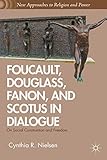Foucault, Douglass, Fanon, and Scotus in dialogue : On social construction and freedom / Cynthia R. Nielsen.
Material type: TextSeries: New approaches to religion and powerPublication details: New York, NY : Palgrave Macmillan, [2013] Description: xv, 212 pages ; 23 cmISBN:
TextSeries: New approaches to religion and powerPublication details: New York, NY : Palgrave Macmillan, [2013] Description: xv, 212 pages ; 23 cmISBN: - 9781137034106 (hardcover)
- 020 1137034106 (hardcover)
- B2430.F724 N54 2013
 Book
Book
| Current library | Collection | Call number | Copy number | Status | Barcode | |
|---|---|---|---|---|---|---|
| Bishop Okullu Memorial Library (Limuru Campus) General Circulation | Non-fiction | B2430.F724 N54 2013 (Browse shelf(Opens below)) | 1 | Available | 045119 |
Includes bibliographical references and index.
Themes and their variations: harmonizing humans as socially constructed and free? -- Foucault and subjectivities -- Frederick Douglass on power relations and resistance "from below" -- Fanon on decolonizing colonized subjectivities and the quest for an historically attuned symphonic humanism -- Duns Scotus and multidimensional freedom -- Recapitulation: humans as socially constructed and free, an ongoing improvisation.
Through examining Douglass's and Fanon's concrete experiences of oppression, Cynthia R. Nielsen demonstrates the empirical validity of Foucault's theoretical analyses concerning power, resistance, and subject-formation. Going beyond merely confirming Foucault's insights, Douglass and Fanon expand, strengthen, and offer correctives to the emancipatory dimensions of Foucault's project. Unlike Foucault, Douglass and Fanon were not hesitant to make transhistorical judgments condemning slavery and colonization. Foucault's reticence here signals a weakness in his account of human being. This weakness sets him at cross-purposes not only with Scotus, but also with Douglass and Fanon. Scotus's anthropology provides a basis for transhistorical moral critique; thus he is a valuable dialogue partner for those concerned about social justice and human flourishing.
There are no comments on this title.
